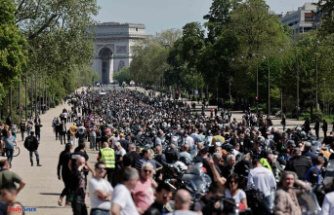According to this, Basildon was considered a barometer of the electoral intentions of the "Essex Man", the stereotype of the conservative-voting worker. He helped Margaret Thatcher win, just as Boris Johnson's party now relies on the votes of voters behind the so-called red Wall in the north of England.
Basildon is also among the constituencies where votes are counted the fastest. That night David Amess was already declared the winner at 23.30. John Major describes in his memories how he waited for the result in his constituency with a glass of cognac. As soon as it came, he shouted to his wife: "That's it, we won.“ The engaging grin of the boyish-looking David Amess impressed everyone who followed the election at the time.
A big Thatcher supporter
Amess was in many ways the epitome of an "Essex Man". He was born in London's East End in 1952, the son of an electrician and a seamstress, and was proud of his roots. The family lived in a terraced house without a refrigerator, but with an outside toilet and a tin bath hanging on the wall. The East End shaped him, Amess said.
At the mass, which was held on Friday evening in the Catholic Church near the place where Amess was fatally injured by an attacker during a voter consultation with a knife, the pastor referred to him as "East End boy". Amess had carried "that great spirit of the East End" with him, "not to be afraid to talk to everyone". This explains why in 1979, while still involved in local politics, Amess was chosen to appear in an advertisement for the Conservative Party with Thatcher, who was not yet Prime Minister.
Boris Johnson visits the crime scene on Saturday : Image: dpaAmess has remained a big supporter of Margaret Thatcher. He considered her "without a doubt" "the most outstanding and thought-provoking politician" of his time.
Amess advocated leaving the European Union and could not believe until the end that this goal was actually realized. It was indicative of his understanding of patriotism that he advocated for a memorial to the popular singer Vera Lynn, who had encouraged the soldier in World War II with home-based songs such as "The White Cliffs of Dover". And it is also characteristic of his sense of humanity that he supported the campaign for a monument to the Swedish diplomat Raoul Wallenberg in recognition of his commitment to the Jews.
Date Of Update: 17 October 2021, 00:00











